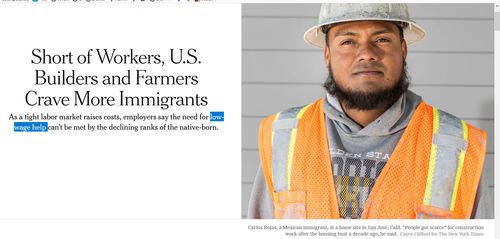


By Steve Sailer
04/04/2019
From the New York Times:
Short of Workers, U.S. Builders and Farmers Crave More Immigrants
As a tight labor market raises costs, employers say the need for low-wage help can’t be met by the declining ranks of the native-born.
By Eduardo Porter
April 3, 2019It takes Carlos Rojas two and a half to three hours to drive from his home in Stockton, Calif., to a job spreading plaster on houses going up in Campbell, on the southern rim of Silicon Valley. The trip is worth it, though. The 30-year-old immigrant from the Mexican state of Oaxaca says he makes roughly $25 an hour, depending on the job. That’s more than twice as much as Stockton’s farmworkers typically make in the fields. And his boss pays for gas.
“A lot of people returned to Mexico after the housing bust, and then came the deportations,” he said. “People got scarce. Now that the work came back they are short of people.”
Nationwide, the average wage of nonsupervisory workers in residential construction hit $25.34 an hour in January. That’s over 6 percent more than a year earlier, close to the steepest annual increase since the government started keeping track almost 30 years ago. Pay is taking off even among those in less-skilled construction trades.
The gains are part of a broader trend. The tightest labor market in more than half a century is finally lifting the wages of the least-skilled workers on the bottom rung of the labor force, bucking years of stagnation.
But to hear builders tell it, the rising cost of their crews reflects a demographic reality that could hamstring industries besides their own: Their labor force is shrinking. President Trump’s threat to close the Mexican border, a move that would cause damage to both economies, only adds to the pressure. …
“The recent shortage of immigrant workers is impacting housing and housing affordability,” said Jerry Howard, chief executive of the National Association of Home Builders. Phil Crone, who runs the association’s Dallas chapter, said the labor bottleneck was adding about $6,000 to the cost of every home built in the area and delaying completion by two months. …
The need for labor has set off a scramble for bodies that is spilling across industries and driving up wages. “A lot of our landscape companies are upset because their guys are coming into construction because they can earn more,” said Alan Hoffmann, who builds energy-efficient homes in Dallas.
For all the fears of robots taking over jobs, some economists are worrying about the broader economic fallout from a lack of low-skilled workers. And businesses across the economy are complaining that without immigration they will be left without a work force.
“It is good for wages to go up, but if labor is at a point where employers can’t hire, it is reducing growth,” said Pia Orrenius, an economist with the Federal Reserve Bank of Dallas. “There’s also considerable wage pressure in small towns and cities that are depopulating, but that is a sign of distress, not of rising productivity.”